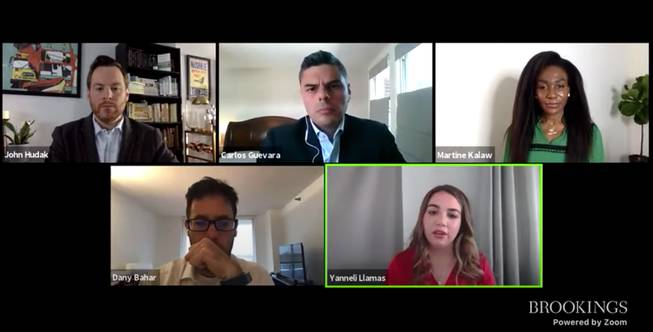
Panelists are shown during an immigration-focused webinar for the Brookings Institution, a public policy think tank that this week launched a podcast series on the subject.
Tuesday, Sept. 22, 2020 | 2 a.m.
UNLV alumna Yanneli Llamas spent two years helping her parents obtain legal residency. They earned it in December, weeks before COVID-19 upended the United States.
Her parents, immigrants from Mexico, came to this country before Llamas and her two brothers were born here, initially on visas that allowed them to cross back and forth. Then those visas expired. For most of her life, her parents were undocumented.
When she turned 21, Llamas petitioned for their legal status.
Her father, a construction worker who now prepares model homes for sale, waited more than 30 years for his green card; her mother, a housekeeper, more than 20.
“I grew up in Las Vegas, which is a very diverse city and very welcoming in many ways, but it’s still something always in the back of your mind — like on road trips, there are certain towns that we don't stop for gas (in) because I feel unsafe,” said Llamas, now a law student on a full-ride scholarship at Arizona State University.
Llamas shared her story Monday during an immigration-focused webinar for the Brookings Institution, a public policy think tank that this week launched a podcast series on the subject.
Brookings President John Allen said the discussion couldn’t be timelier, with 23 million immigrants eligible to vote in the November election and 52% of voters saying immigration is an important topic, according to the Pew Research Center.
Brookings economist Dany Bahar said it isn’t just humane to accept immigrants. It’s also smart.
“All this rhetoric that we hear, that we have been hearing from the White House, particularly in the past couple of years or three years, on migration leading to crime, and migration taking jobs, and migration lowering salaries is just plain wrong,” he said. “It sounds good, maybe, to some people. It might be catchy for political-speak, but when you look at the facts, the data just doesn't support any of them.”
San Diego Mayor Kevin Faulconer leads one half of a “binational megaregion” that shares history, culture and natural resources with Tijuana, physically connected by the busiest land port of entry in the world.
When discussions on immigration get heated, he said he sticks to facts, like San Diego’s consistent ranking as one of the safest big cities in the country, according to FBI statistics.
Faulconer said he and his cross-border colleagues officially work together — their partnership is solidified with an intergovernmental agreement — on economic development, public safety and cultural exchange. They lobby at each other's capitals. Together, the two governments pushed for improvements like the skybridge connecting San Diego and Tijuana International Airport, and expansions to the San Ysidro port of entry, Faulconer said.
“I think we have proved that building bridges is more effective than putting up walls,” he said.
Bahar said contemporary migrants are much like the migrants of 100 years ago, with similar backstories, motivations and successes. And jobs that the Bureau of Labor Statistics say will be in demand include work that historically pulls migrants — like personal home health aides.
“It’s naive to think that the U.S. can thrive in this new era and in general without its migrants,” he said.
Llamas said people don’t humanize immigrants. If they don’t seem human, they can be a target for other people’s problems.
She said people’s lives are hard. They feel unsure.
“I think it's a lot easier to blame someone who looks less like you than to blame your neighbor.”
